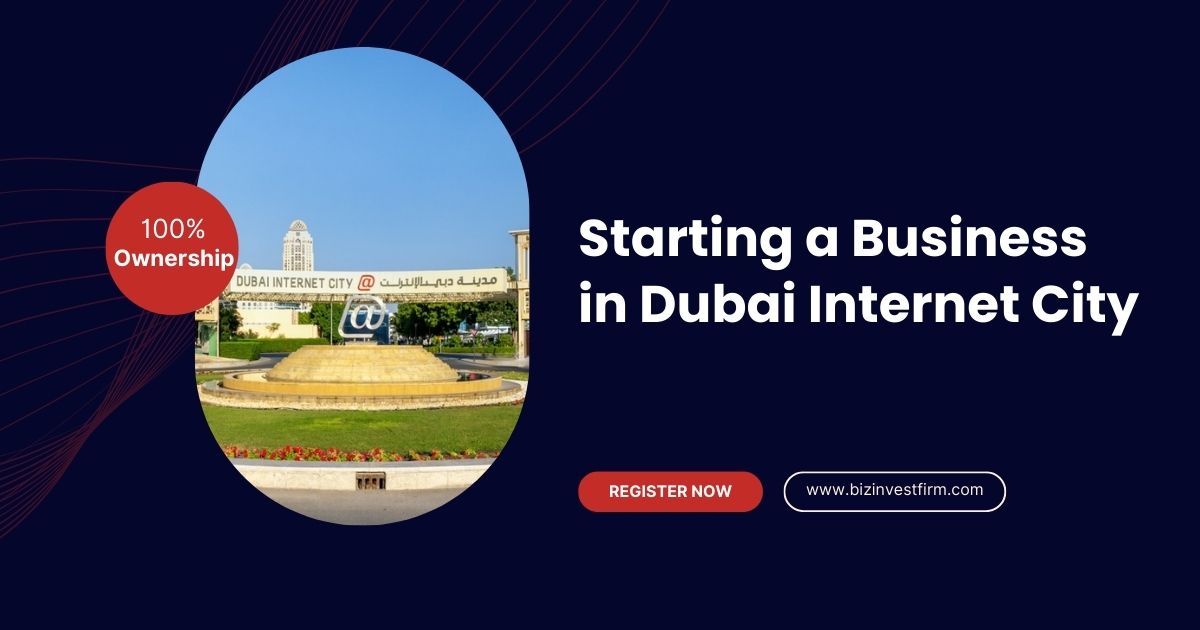Dubai Internet City stands out as a vibrant hub for technology and innovation, drawing entrepreneurs from around the globe who dream of launching ventures in a dynamic environment. Nestled in the heart of Dubai, this free zone caters specifically to tech-savvy businesses, offering a blend of cutting-edge infrastructure and supportive policies that make it easier to turn ideas into reality. Whether you’re in software development, e-commerce, or telecommunications, the area provides unparalleled opportunities for growth amid a community of like-minded professionals.
What makes starting a business in Dubai Internet City so appealing is the combination of tax advantages, full ownership rights, and access to a skilled workforce. Entrepreneurs can navigate the setup process with relative ease, focusing more on innovation than bureaucracy. This guide explores everything from benefits to practical steps, helping you make informed decisions for a successful launch in this thriving ecosystem. By the end, you’ll see why so many choose this spot to build their future.
(Word count: 120)
What is Dubai Internet City?
Dubai Internet City, often abbreviated as DIC, is a specialized free zone designed to foster technology and digital businesses. It serves as a launchpad for companies involved in IT, internet services, and related fields, creating an ecosystem where innovation thrives. Over the years, it has become home to thousands of firms, from startups to global giants like Microsoft and Google.
This zone emphasizes collaboration and growth, providing resources that help businesses scale efficiently. Its strategic positioning in Dubai ensures easy access to international markets, making it a gateway for expansion into the Middle East and beyond. Entrepreneurs appreciate the focus on tech-driven industries, which aligns perfectly with modern business trends.
History and Evolution
Established in 1999, Dubai Internet City was one of the first free zones in the UAE aimed at attracting tech talent and investment. It quickly grew into the region’s largest ICT hub, contributing significantly to Dubai’s economy through job creation and GDP boosts. Today, in 2025, it continues to evolve with advancements in AI, robotics, and digital media.
The zone’s development reflects Dubai’s vision of becoming a global innovation leader. Partnerships with major players have enhanced its offerings, from co-working spaces to advanced data centers. This progression has made it a magnet for forward-thinking entrepreneurs seeking a stable yet progressive base.
Benefits of Establishing Your Venture Here
Launching operations in this tech-focused area comes with a host of advantages that can propel your company forward. For instance, businesses enjoy 100% foreign ownership, eliminating the need for local partners and giving you full control over decisions. Additionally, there’s no corporate or personal income tax for up to 50 years, allowing more funds to be reinvested in growth.
The infrastructure is top-notch, featuring high-speed internet and state-of-the-art facilities that support seamless operations. Networking opportunities abound through events and collaborations, helping you connect with industry leaders. Proximity to major transport links also simplifies logistics and global reach.
- Tax Exemptions: Zero corporate and personal taxes, plus full profit repatriation.
- Ownership Flexibility: Complete foreign control without sponsorship requirements.
- Talent Pool: Access to a diverse, skilled workforce from around the world.
- Infrastructure Perks: Modern offices, data centers, and reliable connectivity.
- Strategic Location: Easy links to airports, ports, and key markets in EMEA.
- Government Support: Initiatives for startups, including funding and mentorship programs.
These perks not only reduce operational hurdles but also enhance competitiveness. Many find that the vibrant community fosters creativity, leading to faster innovation cycles. Overall, it’s a setup that prioritizes long-term success.
Eligible Business Activities
DIC caters to a wide array of tech-oriented pursuits, ensuring your idea fits right in. Common sectors include software development, where companies build apps and platforms, and telecommunications, focusing on network solutions. E-commerce ventures thrive here too, leveraging digital tools for online sales.
Other popular areas encompass IT consultancy, providing expert advice on systems, and multimedia services like content creation. If your work involves data centers or internet-based innovations, this is an ideal fit. Freelancers in design or media can also set up shop with specialized permits.
| Activity Category | Examples |
|---|---|
| Software | App development, coding services |
| Telecommunications | Network setup, VoIP solutions |
| E-Commerce | Online retail, digital marketplaces |
| IT Services | Consulting, cybersecurity |
| Multimedia | Content production, digital marketing |
This variety allows for diverse operations within one zone. It’s worth checking the latest list on the official site to confirm alignment. Tailoring your activity early ensures a smoother approval process.
Legal Structures for Your Company
When starting a business in Dubai Internet City, choosing the right entity type is crucial for alignment with your goals. The most common is the Free Zone Limited Liability Company (FZ-LLC), which supports 1 to 50 shareholders and offers liability protection. No minimum capital is typically required, though it varies by activity.
Branches of existing foreign or UAE companies are another option, allowing expansion without forming a new entity. These don’t need capital investment but must align with parent operations. Freelancers can opt for permits that enable independent work.
Each structure has its nuances, like visa quotas tied to office size. Consulting experts early helps avoid mismatches. This flexibility makes DIC accessible for solos and multinationals alike.
Step-by-Step Guide to Business Setup in Dubai Internet City
Embarking on company setup in Dubai Internet City involves a straightforward path, typically taking 4-6 weeks. Start by defining your business activity and ensuring it matches DIC’s tech focus. Then, select a unique trade name that complies with guidelines.
Next, submit an application online via the DIC portal, including details on shareholders and directors. Await pre-approval, which usually comes in 5-7 days.
- Choose Activity and Name: Pick from approved lists and get name clearance.
- Prepare Documents: Gather passports, business plans, and proofs.
- Apply for Registration: Submit via portal with fees.
- Secure Office Space: Lease a facility, from hot desks to full offices.
- Obtain License: Pay and receive your trade license in about 48 hours.
- Handle Visas: Apply for residency for yourself and staff.
- Open Bank Account: Set up corporate banking for operations.
This sequence minimizes delays if documents are complete. Personal presence may be needed for signing leases or visas. Staying organized keeps things moving smoothly.
Required Documents
Assembling paperwork is key to a hassle-free process. Essentials include passport copies for all shareholders and managers, plus a detailed business plan outlining your operations. Proof of address and no-objection certificates might be needed.
For corporate shareholders, provide registration certificates and board resolutions. Freelancers submit simpler sets, like CVs and portfolios.
- Passport copies (color, valid)
- Visa or entry stamp copies
- Business plan
- Shareholder agreements (if applicable)
- Proof of share capital (if required)
Double-check for notarizations, especially for foreign docs. This preparation avoids rejections and speeds approvals.
Costs Involved
Budgeting accurately is essential when starting a business in Dubai Internet City. License fees start at AED 7,500 for freelancers and range up to AED 50,000 for commercial types. Registration adds AED 3,520 or more.
Office leases vary: hot desks from AED 15,000 annually, while larger spaces cost more. Visa fees per person hover around AED 3,000-5,000.
| Expense Type | Estimated Cost (AED) |
|---|---|
| License Fee | 7,500 – 50,000 |
| Registration | 3,520+ |
| Office Lease | 15,000 – 100,000+ |
| Visa (per person) | 3,000 – 5,000 |
| Miscellaneous (notary, etc.) | 2,000 – 10,000 |
These figures can fluctuate based on specifics. Factor in renewals annually to maintain compliance.
Licensing and Permits
Securing the right license is a pivotal step in your journey. Options include service licenses for consulting or IT support, and commercial ones for trading tech products. Industrial licenses suit light manufacturing in tech.
Freelance permits offer flexibility for individuals, costing less and allowing remote work. Renewals are annual, with penalties for delays. Align your choice with activities to avoid issues.
Types of Licenses
- Service License: Ideal for advisory or support roles in IT.
- Commercial License: For buying, selling, or distributing goods.
- Industrial License: Covers assembly or production of tech items.
- Freelance Permit: Suited for solo professionals in media or design.
Each type ties to visa quotas and office needs. Selecting correctly supports smooth operations.
Office Spaces and Facilities
DIC offers diverse workspaces to match your scale. Co-working areas provide flexibility for startups, with shared amenities like meeting rooms. Larger firms can lease dedicated offices or even buy freehold properties.
Facilities include high-tech data centers and event venues for networking. This setup reduces setup time, letting you focus on core work. Options scale as your business grows.
Visa and Residency Options
Residency visas are a big draw, allowing you and employees to live in the UAE. Tied to your license, quotas depend on office size—starting with one for hot desks. Process involves medical checks and Emirates ID issuance.
Family sponsorship is possible once settled. These visas last 2-3 years, renewable easily. It’s a pathway to long-term stability in Dubai.
Banking and Financial Considerations
Opening a corporate account is straightforward with local banks. Provide your license and docs for setup, enabling smooth transactions. No currency restrictions mean easy international transfers.
Consider multi-currency options for global ops. Financial advisors in DIC can guide on compliance and funding. This setup supports efficient cash flow.
Potential Challenges and Practical Tips
While rewarding, hurdles like document verification can arise. Engage consultants to navigate approvals swiftly. Cultural awareness aids in building local partnerships.
Stay updated on regulations, as they evolve. Networking events help overcome isolation for newcomers. Patience and preparation turn challenges into opportunities.
- Tip: Start with a solid business plan.
- Tip: Budget for unexpected fees.
- Tip: Join community forums for insights.
These strategies ensure a resilient start.
Real-World Success Stories
Many have flourished here, like a software startup that scaled globally through DIC’s networks. Another e-commerce firm benefited from tax savings, reinvesting in expansion. These examples show the zone’s potential.
A telecom branch reports easier talent acquisition, boosting innovation. Such tales inspire confidence in starting a business in Dubai Internet City.
Conclusion
In wrapping up, starting a business in Dubai Internet City offers a blend of innovation, support, and opportunity that’s hard to beat. From tax perks to a thriving tech community, it sets the stage for sustainable growth. With the right preparation, you can navigate the process and position your venture for success.
For personalized guidance, consider partnering with BizInvestFirm. Their experts specialize in seamless setups, handling everything from applications to compliance. Reach out to BizInvestFirm today to turn your DIC ambitions into action.



